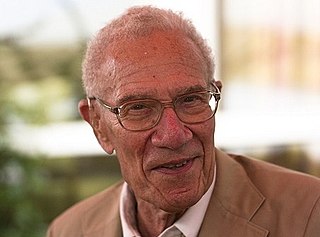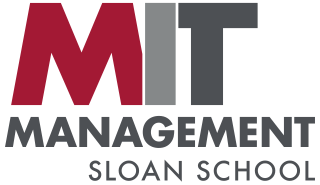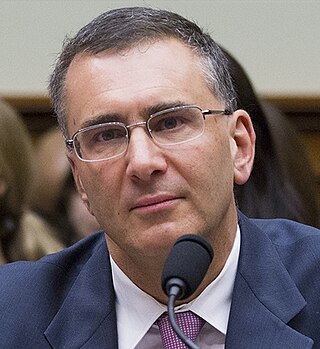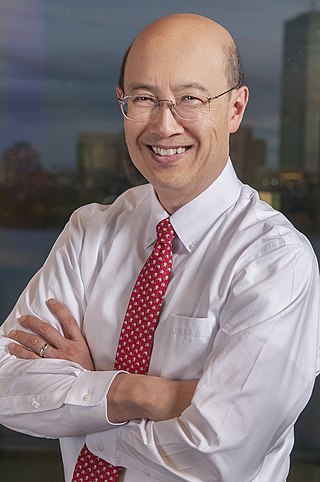Related Research Articles

Franco Modigliani was an Italian-American economist and the recipient of the 1985 Nobel Memorial Prize in Economics. He was a professor at University of Illinois at Urbana–Champaign, Carnegie Mellon University, and MIT Sloan School of Management.

Behavioral economics studies the effects of psychological, cognitive, emotional, cultural and social factors in the decisions of individuals or institutions, and how these decisions deviate from those implied by classical economic theory.

Robert Merton Solow, GCIH is an American economist whose work on the theory of economic growth culminated in the exogenous growth model named after him. He is currently Emeritus Institute Professor of Economics at the Massachusetts Institute of Technology, where he has been a professor since 1949. He was awarded the John Bates Clark Medal in 1961, the Nobel Memorial Prize in Economic Sciences in 1987, and the Presidential Medal of Freedom in 2014. Four of his PhD students, George Akerlof, Joseph Stiglitz, Peter Diamond and William Nordhaus, later received Nobel Memorial Prizes in Economic Sciences in their own right.

The MIT Sloan School of Management is the business school of the Massachusetts Institute of Technology, a private university in Cambridge, Massachusetts. MIT Sloan offers bachelor's, master's, and doctoral degree programs, as well as executive education. Its degree programs are among the most selective in the world. MIT Sloan emphasizes innovation in practice and research. Many influential ideas in management and finance originated at the school, including the Black–Scholes model, the Solow–Swan model, the random walk hypothesis, the binomial options pricing model, and the field of system dynamics. The faculty has included numerous Nobel laureates in economics and John Bates Clark Medal winners.

William Forsyth Sharpe is an American economist. He is the STANCO 25 Professor of Finance, Emeritus at Stanford University's Graduate School of Business, and the winner of the 1990 Nobel Memorial Prize in Economic Sciences.

ENSAE Paris is a university in France, known as Grandes Ecoles and a member of IP Paris. ENSAE Paris is known as the specialization school of École polytechnique for economics, finance, applied mathematics, statistics, and data science. It is one of France's top engineering schools and is directly attached to France's Institut national de la statistique et des études économiques (INSEE) and the French Ministry of Economy and Finance.
Burton Gordon Malkiel is an American economist, financial executive, and writer most noted for his classic finance book A Random Walk Down Wall Street.

William Jack Baumol was an American economist. He was a professor of economics at New York University, Academic Director of the Berkley Center for Entrepreneurship and Innovation, and Professor Emeritus at Princeton University. He was a prolific author of more than eighty books and several hundred journal articles. He is the namesake of the Baumol effect.

Sendhil Mullainathan is an American professor of Computation and Behavioral Science at the University of Chicago Booth School of Business and the author of Scarcity: Why Having Too Little Means So Much. He was hired with tenure by Harvard in 2004 after having spent six years at MIT.
The random walk hypothesis is a financial theory stating that stock market prices evolve according to a random walk and thus cannot be predicted.
Analysis Group, Inc. (AG), founded in 1981 by economists Bruce E. Stangle and Michael F. Koehn, is an economic consulting firm based in North America. It provides economic, financial, and strategic analysis and expert testimony to law firms, corporations, and government agencies.
Zvi Bodie is an American economist, author and professor. He was the Norman and Adele Barron Professor of Management at Boston University, teaching finance at Questrom for 43 years before retiring in 2015. His textbook, Investments, (with Kane and Marcus) is the market leader and is used in the certification programs of the CFA Institute and the Society of Actuaries. Bodie's work has centered on pension finance and investment strategy. He continues to do consulting work and media interviews.
Alan J. Marcus is an American economist, and the first recipient of the Mario J. Gabelli Endowed Professorship at the Carroll School of Management at Boston College, where he currently teaches. He is an author of several textbooks widely used in finance and MBA programs internationally, including Fundamentals of Corporate Finance with Stewart Myers and Richard A. Brealey. Marcus serves on the advisory board of the CFA Institute.

Jonathan Holmes Gruber is an American professor of economics at the Massachusetts Institute of Technology, where he has taught since 1992. He is also the director of the Health Care Program at the National Bureau of Economic Research, where he is a research associate. An associate editor of both the Journal of Public Economics and the Journal of Health Economics, Gruber has been heavily involved in crafting public health policy.

Esther Duflo Banerjee, FBA is a French–American economist who is a professor of Poverty Alleviation and Development Economics at the Massachusetts Institute of Technology (MIT). She is the co-founder and co-director of the Abdul Latif Jameel Poverty Action Lab (J-PAL), which was established in 2003. She shared the 2019 Nobel Memorial Prize in Economic Sciences with Abhijit Banerjee and Michael Kremer, "for their experimental approach to alleviating global poverty".

Andrew Wen-Chuan Lo is the Charles E. and Susan T. Harris Professor of Finance at the MIT Sloan School of Management. Lo is the author of many academic articles in finance and financial economics. He founded AlphaSimplex Group in 1999 and served as chairman and chief investment strategist until 2018 when he transitioned to his current role as chairman emeritus and senior advisor.

The Abdul Latif Jameel Poverty Action Lab (J-PAL) is a global research center working to reduce poverty by ensuring that policy is informed by scientific evidence. J-PAL conducts randomized impact evaluations to answer critical questions in the fight against poverty, and builds partnerships with governments, NGOs, donors, and others to generate new research, share knowledge, and scale up effective programs.

Dean Karlan is an American development economist. He is Professor of Economics and Finance at Northwestern University where, alongside Christopher Udry, he co-founded and co-directs the Global Poverty Research Lab at Kellogg School of Management. Karlan is the president and founder of Innovations for Poverty Action (IPA), a New Haven, Connecticut, based research outfit dedicated to creating and evaluating solutions to social and international development problems. He is also a Research Fellow and member of the Executive Committee of the board of directors at the Abdul Latif Jameel Poverty Action Lab (J-PAL) at the Massachusetts Institute of Technology. Along with economists Jonathan Morduch and Sendhil Mullainathan, Karlan served as director of the Financial Access Initiative (FAI), a consortium of researchers focused on substantially expanding access to quality financial services for low-income individuals.
Jeffrey Richard Kling is the research director at the Congressional Budget Office, and was previously the associate director for economic analysis. Kling is also a faculty research fellow at the National Bureau of Economic Research and a senior investigator for the long-term evaluation of the Moving to Opportunity randomized housing mobility experiment.
Marianne Bertrand is a Belgian economist who currently works as Chris P. Dialynas Professor of Economics at the University of Chicago's Booth School of Business. Bertrand belongs to the world's most prominent labour economists in terms of research, which has been awarded the 2004 Elaine Bennett Research Prize and the 2012 Sherwin Rosen Prize for Outstanding Contributions in the Field of Labor Economics. She is a research fellow of the National Bureau of Economic Research, and the IZA Institute of Labor Economics.
References
- 1 2 3 4 Stanton, Victoria (June 1, 2012). "Stangle Award answers the question 'What's in a name?'". Bates Magazine. Retrieved May 10, 2020.
{{cite web}}: CS1 maint: url-status (link) - ↑ "Alumni Magazine - Alumni Profile: Paul Greenberg, SM '88 and Marla Choslovsky, SM '88 - MIT Sloan Alumni Magazine". mitsloan-lweb1.mit.edu. Retrieved 2020-06-03.
- 1 2 3 "Bruce E. Stangle". Analysis Group. May 10, 2020. Retrieved May 10, 2020.
{{cite web}}: CS1 maint: url-status (link) - ↑ Glater, Jonathan D. (2005-08-19). "More and More, Expert Witnesses Make the Difference". The New York Times. ISSN 0362-4331 . Retrieved 2020-06-03.
- ↑ "Securities class action doesn't suit us". The Economic Times. Retrieved 6 April 2017.
- ↑ Stangle, Bruce; Malkiel, Burton G.; Mullainathan, Sendhil (2005-06-01). "Market Efficiency versus Behavioral Finance". Rochester, NY. SSRN 3396133.
{{cite journal}}: Cite journal requires|journal=(help) - ↑ Stanton, Victoria (April 21, 2014). "Hire smart people and lean on the Bates network, says Entrepreneurship speaker Bruce Stangle '70". Bates Magazine. Retrieved May 10, 2020.
{{cite web}}: CS1 maint: url-status (link) - ↑ "Executive Profile: Bruce Edward Stangle". Bloomberg.com. Retrieved 6 April 2017.